The AI Revolution Transforming Property Operations
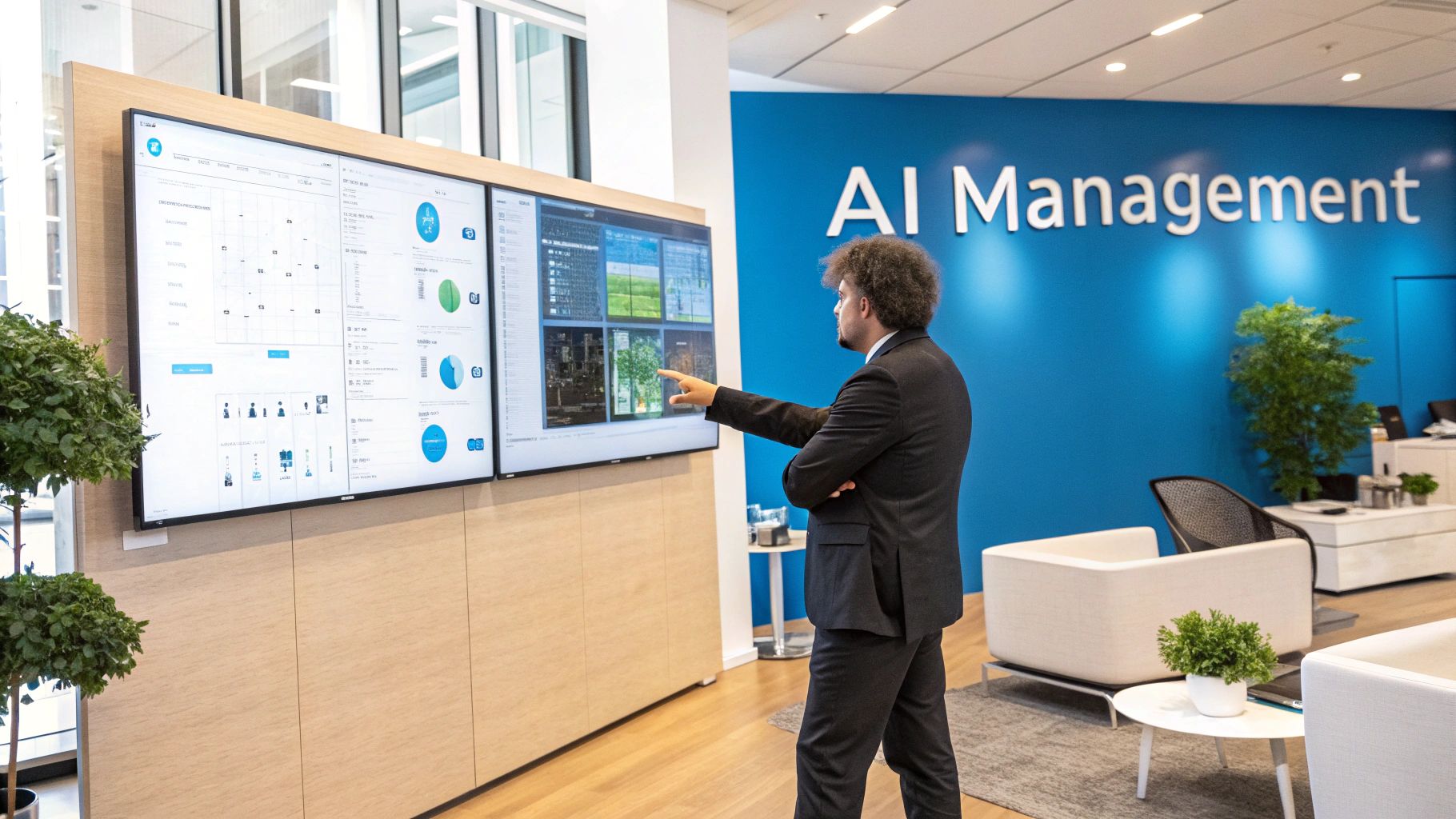
The property management industry is undergoing a significant transformation. Artificial intelligence (AI) is playing a key role in reshaping how things are done. This goes beyond simply automating repetitive tasks. It's about fundamentally changing how property managers work and interact with residents. Forward-thinking property managers are adopting AI to boost efficiency and improve resident experiences, leaving behind companies clinging to outdated methods.
This shift is being driven by several factors. Persistent labor shortages are a major contributor, along with increasing resident expectations for seamless, on-demand service. Property managers need to adapt and evolve their strategies to keep up with these changing dynamics.
Machine Learning and Data-Driven Decisions
One key area where AI is making a big impact is through machine learning. This technology helps property managers make better, data-driven decisions. Machine learning algorithms can analyze large amounts of data to predict maintenance needs, something that can save significant time and resources.
These algorithms can also optimize pricing strategies and identify potential tenant risks. This allows property managers to be proactive rather than reactive, addressing potential problems before they escalate. This proactive approach can lead to cost savings and improved resident satisfaction.
Transforming Communication with Natural Language Processing
Natural Language Processing (NLP) is another area where AI is transforming property management. NLP powers AI chatbots, enabling them to understand and respond to resident inquiries quickly and effectively. This frees up property managers from handling routine requests, allowing them to focus on more complex tasks.
It also provides residents with the instant support they expect in today's fast-paced world, leading to improved satisfaction. It's important to note that these advancements are designed to augment the capabilities of property managers, not replace human interaction.
AI: From Potential to Tangible Outcomes
AI is increasingly crucial for improving operational efficiency and enhancing resident experiences. By 2025, multifamily operators are predicted to shift their focus from evaluating AI's potential ROI to implementing AI tools to achieve measurable results. Explore this topic further. This highlights the growing recognition of AI's practical value in the field.
You might also be interested in learning more about The Best AI-Powered Property Management Tools. This transition signals a major turning point, where AI is no longer considered experimental but a necessary tool for success. The emphasis on tangible outcomes reinforces this shift, positioning AI as a current solution, not just a future concept.
These innovations empower property managers to not only meet the increasing demands of their residents but also gain a competitive edge. As AI continues to develop, its influence on property management will only grow stronger, shaping the industry for years to come.
Real Time Savings That Actually Matter
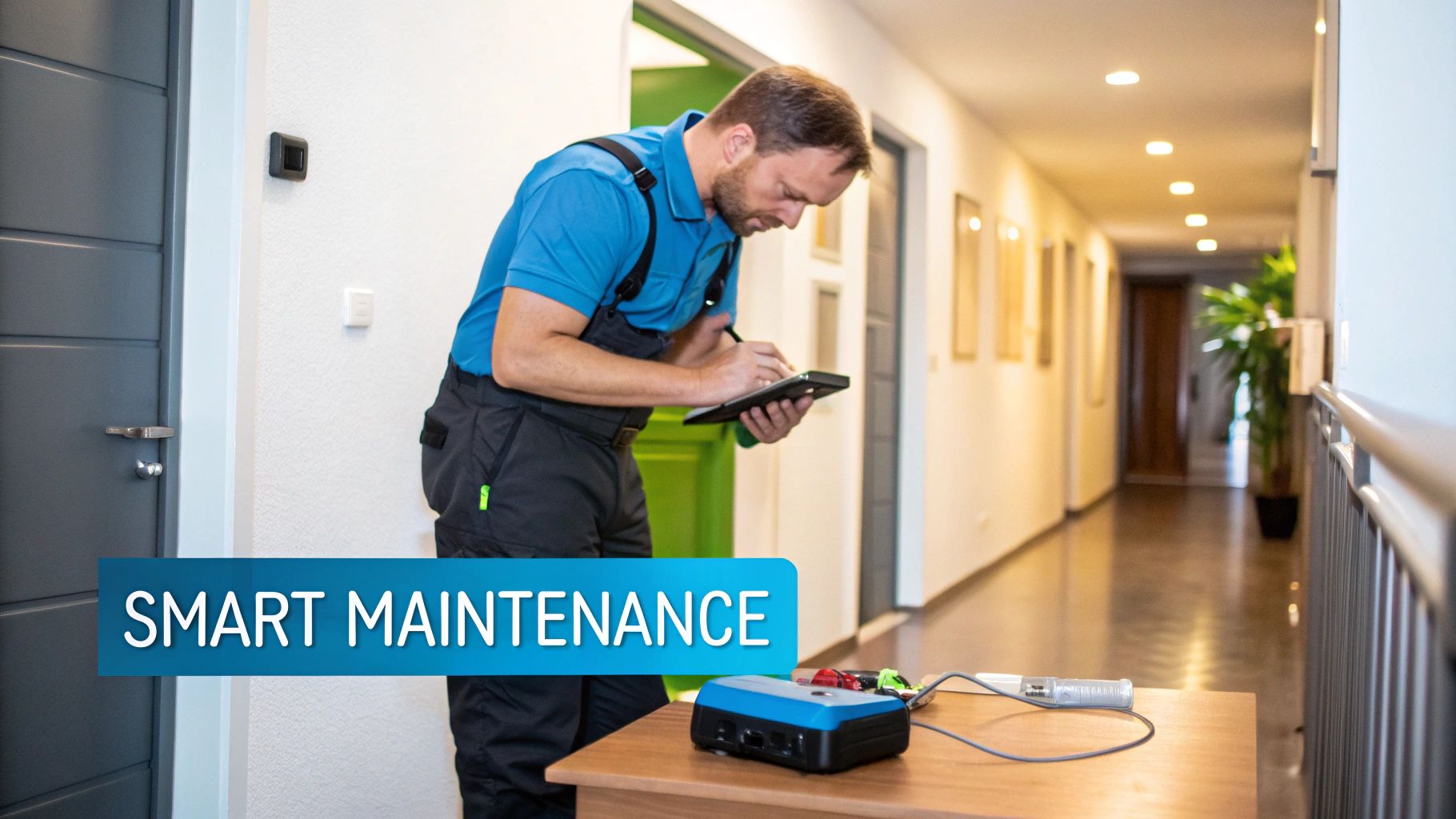
Time is invaluable in property management. Artificial intelligence offers the potential to reclaim a significant amount of this precious resource. This isn't about small improvements; it's about fundamentally changing how property managers work, allowing them to concentrate on high-impact tasks.
Automating The Mundane: Freeing Up Time For What Matters
Many property managers get bogged down by administrative work. While essential, these tasks often prevent them from focusing on resident relationships and business growth. Artificial intelligence provides a solution by automating many of these tedious processes.
For example, AI-powered scheduling tools like Calendly can handle bookings and showing coordination, freeing up hours each week. This extra time allows for more focus on strategic initiatives that drive business growth, leading to increased revenue and improved resident satisfaction.
Additionally, AI can automate communication with tenants and prospects. This includes responding to inquiries, sending reminders, and providing updates. This frees up property managers to focus on strategic planning and relationship building.
From Reactive To Proactive: Predictive Analytics And Maintenance
Another key area where AI saves time is maintenance management. Traditional maintenance is often reactive, addressing problems only after they occur. This approach can be costly and disruptive.
However, predictive analytics, powered by AI, can anticipate maintenance needs before they become major issues. This proactive approach not only saves time but also reduces costs by addressing potential problems early.
This translates to fewer emergency calls, less downtime, and happier residents, contributing to a more efficient and profitable business. Early identification of potential problems minimizes disruptions for residents and avoids expensive repairs.
Measuring The Impact: Real-World Time Savings With AI
The time savings from AI in property management aren't theoretical. Operators using embedded generative AI solutions report saving over 10 hours per week. Find more detailed statistics here. This allows property managers to focus on activities that directly affect their bottom line.
This valuable time can be reallocated to essential tasks, like resident retention, marketing strategies, or property improvements. AI empowers property managers to be more proactive and strategic. This shift from reactive to proactive management is a key benefit of AI implementation.
Reinvesting The Gains: How Smart Operators Use Their Extra Time
The time saved through AI isn't just a reduction in workload. Smart operators are strategically reinvesting this time in activities that drive business growth. This might involve improving resident relations, expanding their portfolio, or adopting new technologies.
For instance, some are using the time to personalize resident experiences. This includes offering tailored amenities and services, which can increase tenant retention and generate positive referrals. Others are using this time to analyze market trends and identify new investment opportunities. The strategic reinvestment of saved time is a significant advantage of AI-powered property management.
The Real Cost Impact Of AI Implementation
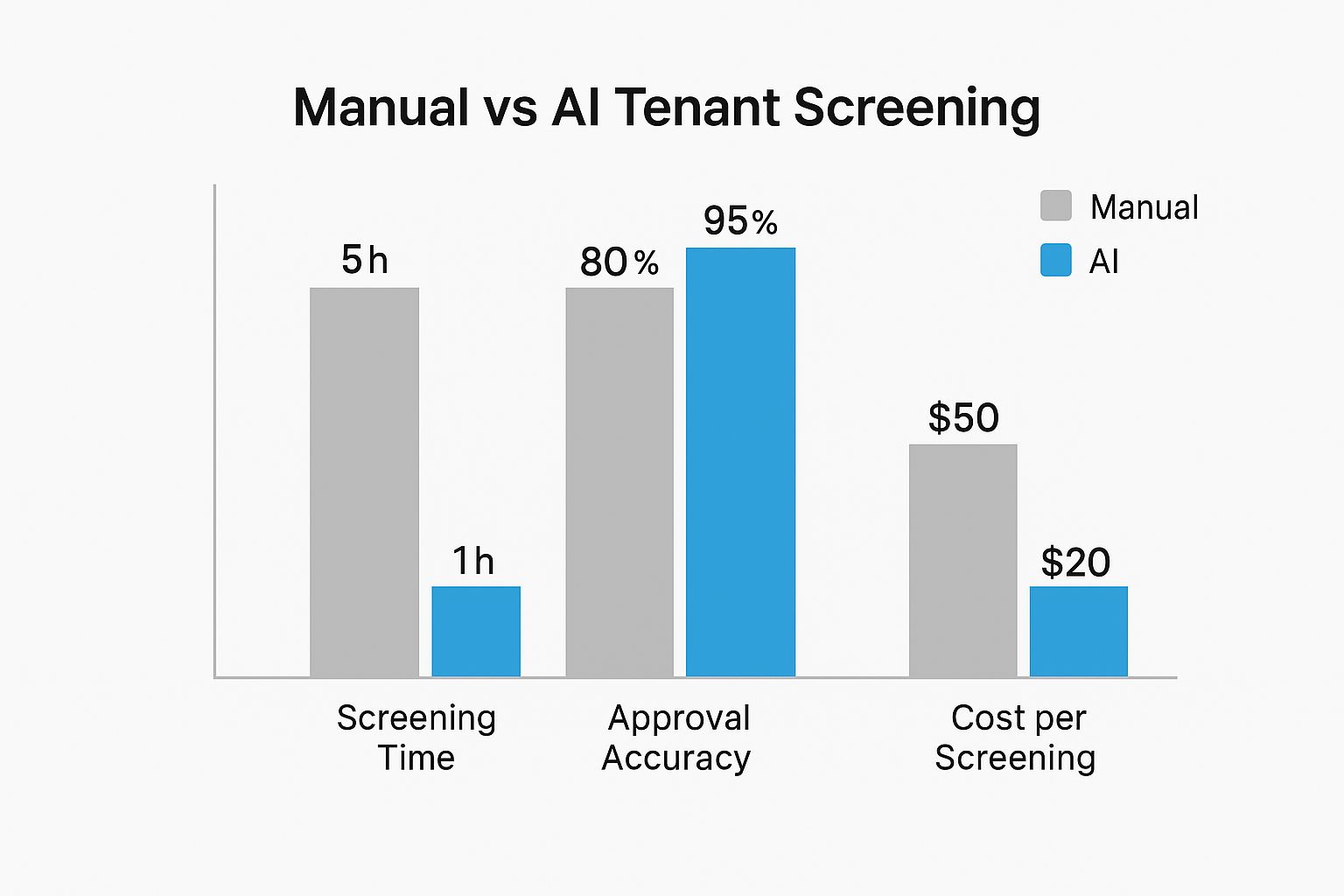
The infographic above illustrates the difference between manual and AI-driven tenant screening. Key metrics compared include screening time, approval accuracy, and cost. The data shows AI drastically reduces screening time from 5 hours to a mere 1 hour.
It also increases approval accuracy from 80% to an impressive 95%. Plus, the cost per screening drops from $50 to $20. This leads to significant cost savings and more efficient tenant selection. This is just one example of AI's financial impact on property management.
Beyond the buzz around artificial intelligence in property management, understanding the financial implications is key. This means looking at both the initial investment and the potential long-term savings. Implementing AI does come with upfront costs. These include software acquisition, integration, and possibly staff training.
However, these initial costs are often small compared to the potential long-term operational savings. These savings come from automation, better decision-making, and fewer costly errors. For instance, AI-powered predictive maintenance can reduce expensive emergency repairs and extend equipment lifespan.
Hidden Savings and Improved Service Quality
The cost benefits of automating tasks like tenant screening are clear. However, AI also offers less obvious savings. These come from increased efficiency in areas like maintenance scheduling and resource allocation. Fewer human errors also translate to significant financial gains.
Furthermore, AI can boost service quality, leading to happier tenants and higher retention rates. Satisfied tenants tend to renew leases, reducing vacancy rates and marketing costs. This creates a positive cycle that significantly impacts a property management company's bottom line. Currently, 49% of real estate business owners report cost reductions thanks to AI, with potential savings up to 15% in operational costs. You can find more detailed statistics here.
To further illustrate the financial benefits of AI implementation, let's examine a cost-benefit analysis across different property management functions.
The following table summarizes typical implementation costs and projected annual savings for various AI applications:
As the table demonstrates, while initial implementation costs can vary, the potential for annual savings and a relatively short ROI timeline make a compelling case for AI adoption in property management.
Investment Timelines and ROI
Understanding typical investment timelines and return on investment (ROI) is crucial when considering AI solutions. The payback period depends on the specific AI applications and the size of the property portfolio. Factors influencing ROI include integration complexity, pricing models (subscription vs. one-time purchase), and the extent of staff training.
Building a strong business case is essential for getting stakeholder buy-in. This means clearly explaining the potential cost savings, efficiency gains, and service quality improvements AI can deliver. You might find this article helpful: How to master AI marketing automation. With thorough financial analysis, property managers can show the value of AI investment and get the support needed for implementation.
Revolutionizing Tenant Screening With Smart Technology
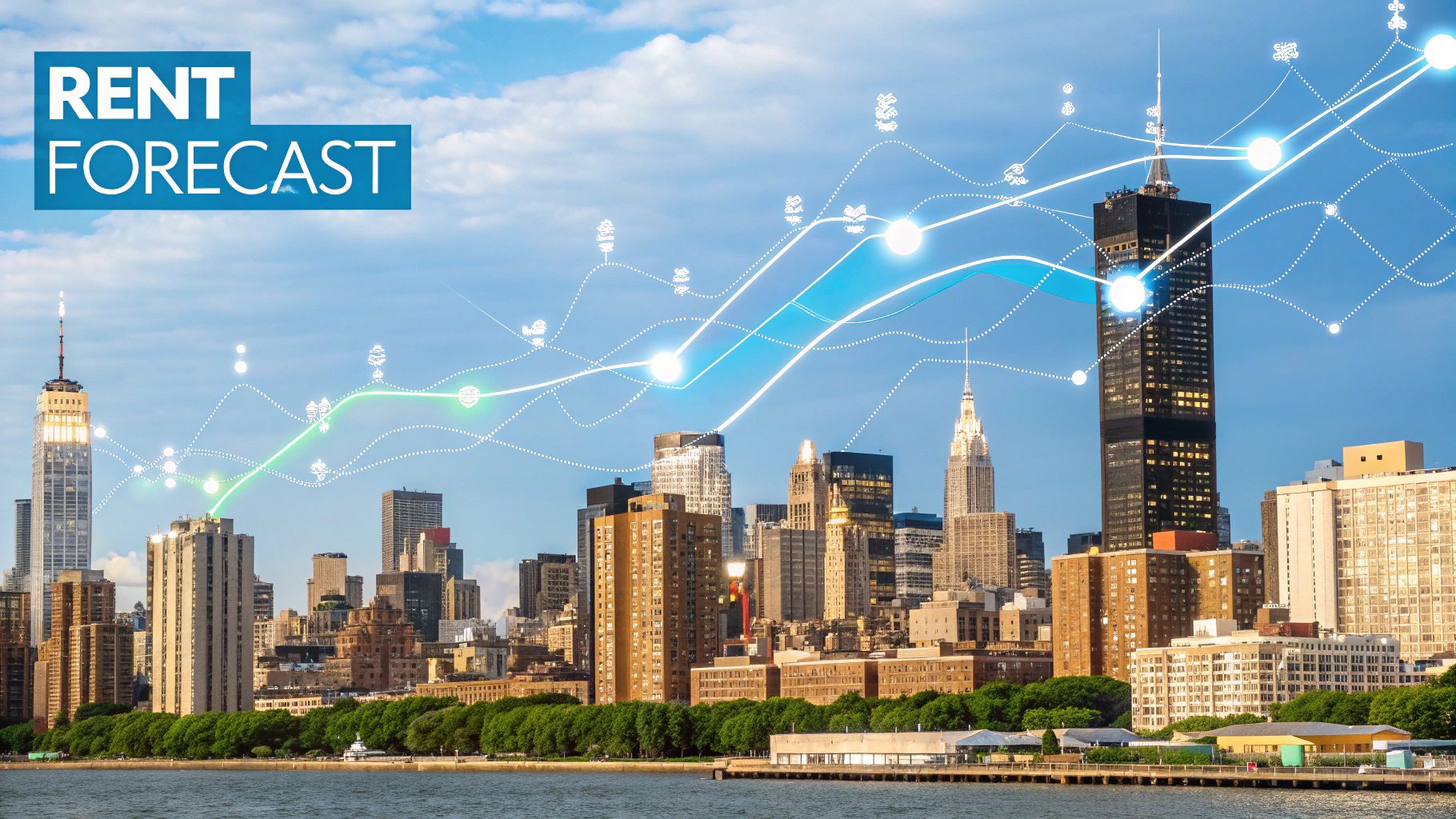
Tenant screening is crucial for property managers. Traditionally, this process was slow, often relying on manual checks and intuition. However, artificial intelligence (AI) is transforming tenant screening into a data-driven, efficient process. This shift is improving both the speed and accuracy of finding reliable tenants.
Automating the Essentials: Document Verification and Risk Assessment
AI is automating key aspects of tenant screening, beginning with document verification. Instead of manually reviewing pay stubs and contacting references, AI-powered tools can quickly and accurately verify applicant-provided information. This not only saves valuable time but also minimizes the potential for human error.
Beyond simple verification, AI algorithms can analyze risk more effectively. These algorithms assess various data points, including credit history, rental history, and even social media presence (where permissible and compliant with fair housing laws). This creates a more comprehensive risk profile for each applicant.
Predictive Analytics: Finding the Best Tenants
AI goes beyond simply assessing risk; it can predict future tenant behavior. Predictive analytics leverages historical data to identify patterns and trends. This helps property managers predict which applicants are more likely to pay rent on time, have longer lease terms, and respect the property. Ultimately, this data empowers property managers to make informed decisions, reducing potential issues down the road.
This data-driven approach leads to better tenant selection and higher resident retention. By identifying reliable tenants early in the process, property managers can reduce tenant turnover and its associated costs. Fewer problem tenants means less time spent on conflict resolution, contributing to smoother operations overall.
Time Savings and Improved Outcomes with AI-Powered Screening
The impact of AI on tenant screening is substantial. By streamlining the process and providing insightful data, AI saves property managers significant time. In fact, by 2025, AI is projected to reduce the time spent on tenant screening by a remarkable 75%. Explore this topic further here. This allows property managers to dedicate more time to other important aspects of their business.
These time savings translate into tangible cost reductions and improved business performance. By automating tedious tasks, AI frees up property managers to cultivate relationships with residents, optimize their property portfolios, and focus on business growth. Learn more about using AI as a leasing assistant: How to use ChatGPT as a leasing assistant. This shift towards efficiency and data-driven decisions is reshaping the property management industry.
Maintaining Fairness and Compliance in AI-Driven Tenant Screening
While AI offers considerable benefits for tenant screening, it’s important to address potential fairness and compliance concerns. Ensuring AI algorithms do not perpetuate bias is paramount. Property managers must use tools that adhere to fair housing standards.
This includes thoroughly vetting AI vendors, understanding the data used to train algorithms, and implementing safeguards to prevent discrimination. Regular audits and careful monitoring are also crucial for maintaining compliance. This ensures AI-powered tenant screening remains a fair and ethical practice. By proactively addressing these concerns, property managers can utilize the power of AI while upholding ethical and legal requirements.
Smart Buildings That Actually Work For Residents
The intersection of artificial intelligence (AI) and the Internet of Things (IoT) is changing the way buildings operate, creating more responsive and efficient spaces. However, property managers need to distinguish truly beneficial smart building technologies from simple novelties. Prioritizing resident needs and operational enhancements is crucial for successful AI integration in property management.
Predictive Maintenance: Preventing Problems Before They Arise
AI-powered predictive maintenance analyzes data from building sensors to foresee potential issues. For instance, water pressure sensors can identify a minor leak before it becomes a major flood, saving time and money. This proactive approach minimizes disruptions for residents and prolongs the life of building systems.
Predictive maintenance also lowers operational costs by preventing major repairs and optimizing maintenance schedules. Consider a scenario where an elevator's potential malfunction is detected based on subtle data changes. Technicians can address the issue proactively during off-peak hours, minimizing resident inconvenience and averting a costly breakdown. This results in significant cost savings and higher resident satisfaction.
Optimizing Energy Consumption: Reducing Costs Without Sacrificing Comfort
AI algorithms optimize energy use throughout a building without compromising resident comfort. By analyzing data from occupancy sensors, smart thermostats like Nest, and energy usage patterns, these algorithms intelligently adjust heating, cooling, and lighting. This dynamic approach ensures optimal energy use while maintaining a comfortable environment.
This intelligent control reduces energy waste, lowering utility bills for both property managers and residents. For example, an AI system might learn that certain building areas are unoccupied during specific times and automatically reduce energy consumption in those zones. This automated optimization leads to substantial savings without sacrificing resident comfort, balancing financial and environmental responsibility.
Personalized Comfort: Automated Environmental Controls
AI enhances resident comfort with automated environmental controls. Imagine a building where the temperature adjusts to individual preferences as residents enter their apartments. AI-powered systems also optimize lighting based on natural daylight, creating a more pleasant and energy-efficient environment.
This personalized comfort boosts resident satisfaction and well-being. It can also justify premium rents, giving properties with AI-driven environmental controls a competitive edge. AI integration with IoT devices and robust datasets will create even smarter buildings and more personalized resident services, solidifying AI’s role in modern property management. Learn more about this growing trend here.
The following table summarizes the various AI applications discussed and their benefits for both property managers and residents.
Smart Building AI Applications and Benefits
As this table highlights, AI offers a range of advantages for all stakeholders in the smart building ecosystem.
Retrofitting for a Smarter Future: Practical Guidance
Smart building technology doesn't always require new construction. Many AI-powered systems can be retrofitted into existing properties. This allows property managers to enhance their offerings and attract tech-savvy residents.
By strategically integrating AI solutions, property managers can create modern, desirable living spaces that justify higher rents. Careful planning and a focus on resident needs ensure these upgrades provide real value and a positive return on investment. This forward-thinking approach uses AI to improve operational efficiency and enhance resident experiences.
Creating Resident Experiences People Actually Want
Modern residents expect responsive, personalized service. Property managers who deliver these experiences are truly thriving in today's competitive market. This section explores how artificial intelligence (AI) empowers property managers to create exceptional resident experiences at scale, without breaking the bank. We'll delve into specific AI applications that enhance resident satisfaction.
Intelligent Chatbots: Moving Beyond Simple FAQs
Think of AI chatbots as digital concierges, available 24/7. These intelligent assistants can answer resident questions, handle maintenance requests, and even offer personalized recommendations. For example, a chatbot could guide a new resident through setting up utilities or book amenity reservations effortlessly.
These aren't your average FAQ bots. Advanced AI chatbots can understand complex language, learn from past interactions, and even proactively offer assistance. This offers residents immediate support and frees up property managers for more strategic tasks. This level of responsiveness greatly boosts resident satisfaction.
Predictive Maintenance: Preventing Disruptions Before They Happen
Imagine a building where maintenance issues are resolved before they become problems. This is the potential of AI-driven predictive maintenance. By analyzing data from building systems, AI can predict when equipment requires attention.
For example, AI could analyze elevator usage patterns and predict upcoming maintenance needs. This prevents unexpected breakdowns and minimizes disruptions. This proactive approach not only enhances resident satisfaction but also saves money on costly emergency repairs.
Personalized Service Strategies: AI-Driven Insights
AI provides property managers with invaluable insights into resident preferences and needs. By analyzing data from various sources, like resident feedback and online reviews, AI can identify areas for improvement. This data allows property managers to truly personalize their services.
For example, AI might reveal that residents are requesting more pet-friendly amenities. This insight allows property managers to adapt and create a more appealing environment for pet owners. This data-driven approach creates more relevant and personalized resident experiences.
Measuring Resident Experience Improvements: The Metrics That Matter
Measuring the impact of AI on resident experience is crucial. Key metrics include resident satisfaction scores, online reviews, and lease renewal rates. Tracking these metrics allows property managers to assess the effectiveness of their AI strategies and make data-driven adjustments.
Furthermore, AI can track response times to resident inquiries and the resolution rate of maintenance requests. These real-time data points provide valuable feedback, allowing property managers to continuously refine their AI-powered approaches. This ongoing improvement cycle is essential for long-term success.
Avoiding Pitfalls: Keeping AI Helpful, Not Frustrating
While AI offers tremendous potential, it’s important to avoid common implementation pitfalls. One key challenge is ensuring that resident-facing AI technologies are user-friendly and intuitive. Poorly designed chatbots or complex interfaces can quickly lead to resident frustration.
Property managers should thoroughly test any AI tools before widespread deployment, gathering resident feedback and making any necessary adjustments. It's also important to remember that AI should augment, not replace, human interaction. Finding the right balance between automation and personal touch is essential for successful AI integration.
Streamlining Operations with Showdigs: The AI-Powered Solution
Ready to experience the benefits of AI in your property management business? Showdigs is a leading AI-powered leasing automation platform designed for single-family property managers. From automated showings and lead communications to seamless integrations with existing tools, Showdigs streamlines your entire leasing process. Visit Showdigs today to learn more and transform your leasing operations.




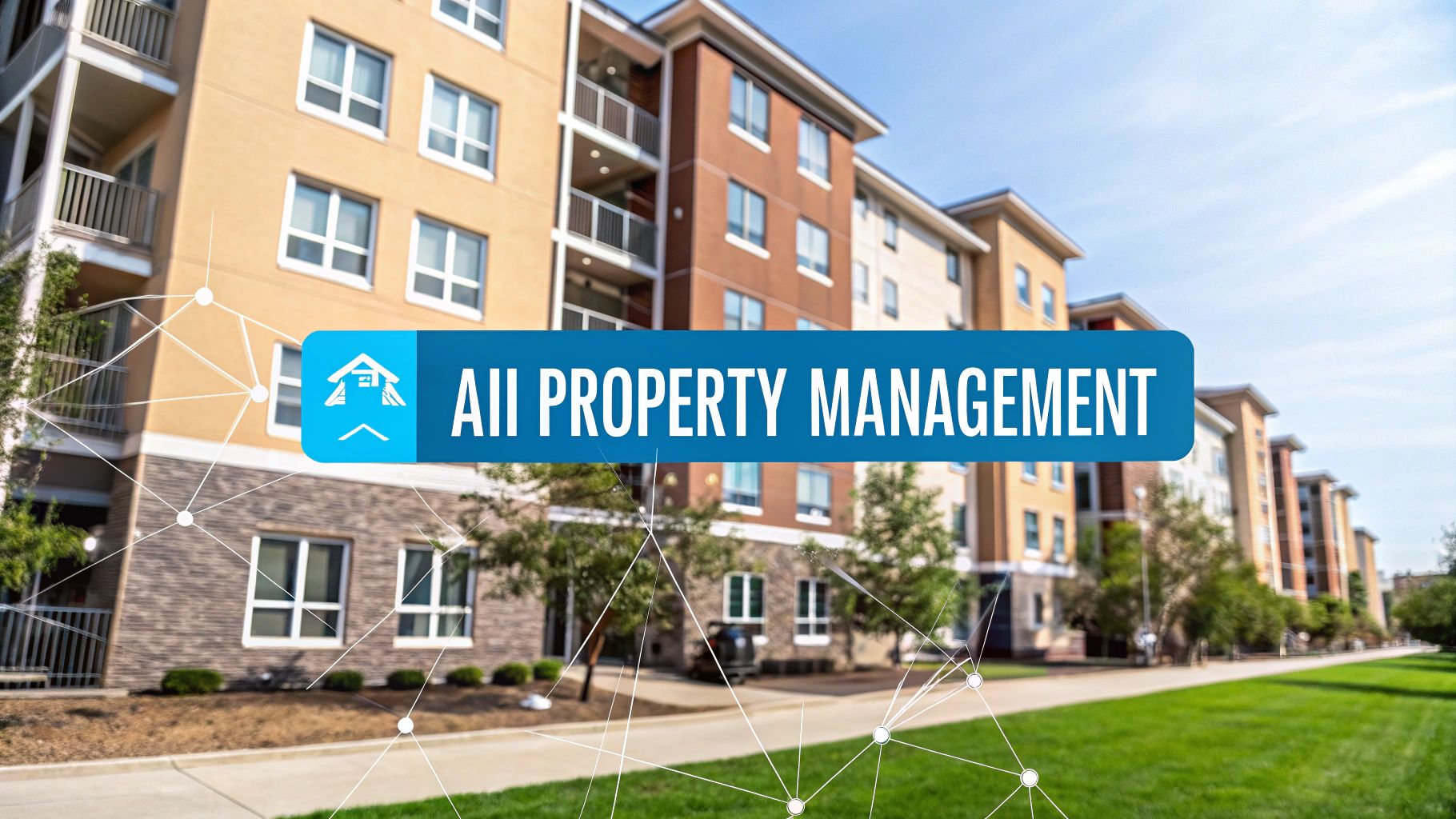
.png)
.png)
.png)